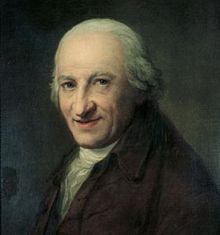Carl Friedrich Christian Fasch | |
|---|---|
 Portrait of Carl Friedrich Christian Fasch by Anton Graff | |
| Born | |
| Died | 3 August 1800 (aged 63) |
| Occupations |
|
Carl Friedrich Christian Fasch (1736–1800) was a German composer and harpsichordist. Born in Zerbst, he was the son of the composer Johann Friedrich Fasch. He was initially taught by his father.
In 1756 he began service at the court of Frederick the Great of Prussia, where he served as deputy to Court harpsichordist C.P.E. Bach, whose post he attained when Bach left the court for Hamburg in 1767.[1] In 1791 he founded the Sing-Akademie in Berlin[2] which quickly became an important centre of Berlin's musical life. In its concerts Fasch promoted the music of J.S. Bach and other masters of the Baroque period, as well as contemporary music. The Akademie was visited by Beethoven in 1796. Fasch also composed numerous works for the Sing-Akademie. His Mass for sixteen voices, a virtuosic mass accompanied solely by organ continuo, is a choral masterpiece of the late 18th century.[3]
Fasch died in Berlin in 1800. His grave is preserved in the Protestant Friedhof I der Jerusalems- und Neuen Kirchengemeinde (Cemetery No. I of the congregations of Jerusalem's Church and New Church) in Berlin-Kreuzberg, south of Hallesches Tor. He was succeeded as head of the Akademie by Carl Friedrich Zelter.
- ^ Barr, Raymond. "Fasch, Carl Friedrich Christian." In Grove Music Online.
- ^ Brown, A. Peter; Weber, William (June 1993). ""The Rise of Classics in Eighteenth-Century England: A Study in Canon, Ritual, and Ideology"". The American Historical Review. 98. New York: Clarendon Press of Oxford University Press: 871–872. doi:10.2307/2167608. JSTOR 2167608 – via American Historical Association.
- ^ Kelly, Ryan Michael. "Carl Friedrich Christian Fasch and His Mass for Sixteen Voices with Performance Edition." D.M.A. diss. Michigan State University, 2012.